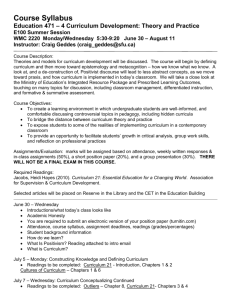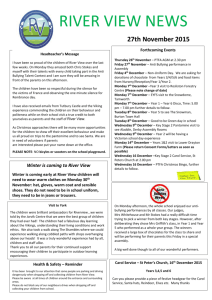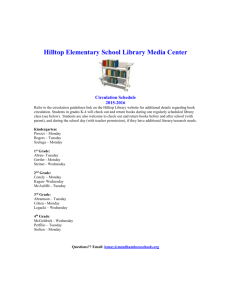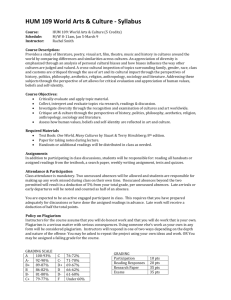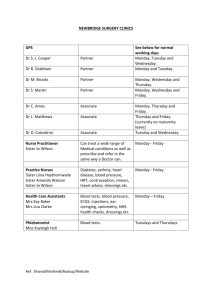INLS520-S14 - UNC School of Information and Library Science
advertisement
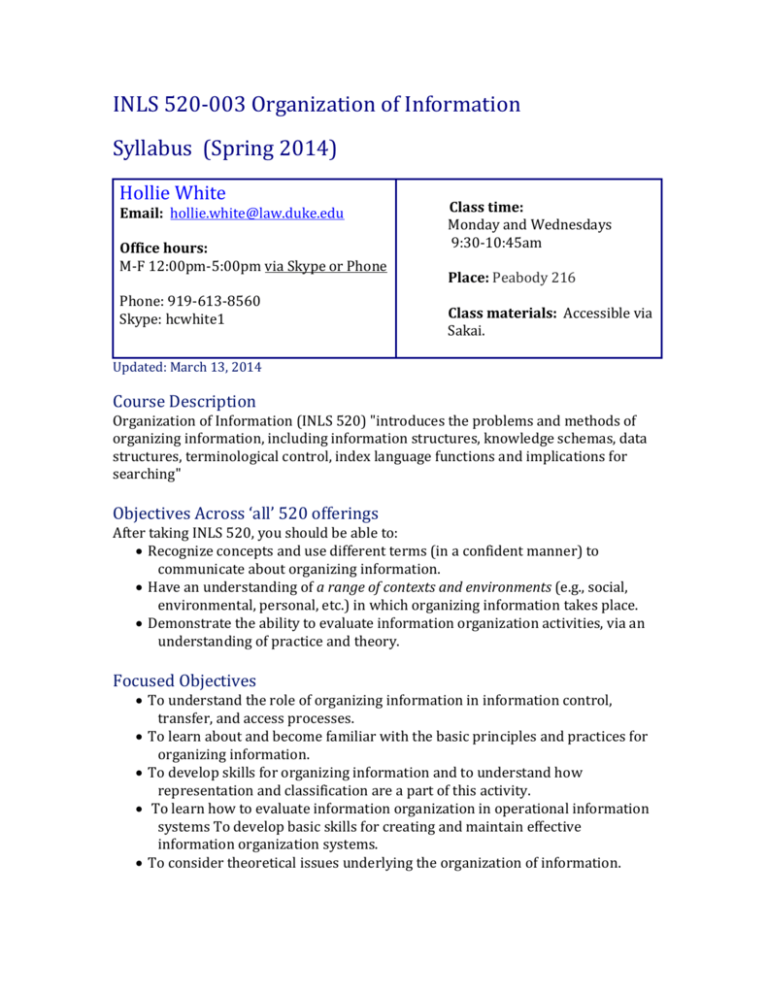
INLS 520-003 Organization of Information Syllabus (Spring 2014) Hollie White Email: hollie.white@law.duke.edu Office hours: M-F 12:00pm-5:00pm via Skype or Phone Phone: 919-613-8560 Skype: hcwhite1 Class time: Monday and Wednesdays 9:30-10:45am Place: Peabody 216 Class materials: Accessible via Sakai. Updated: March 13, 2014 Course Description Organization of Information (INLS 520) "introduces the problems and methods of organizing information, including information structures, knowledge schemas, data structures, terminological control, index language functions and implications for searching" Objectives Across ‘all’ 520 offerings After taking INLS 520, you should be able to: Recognize concepts and use different terms (in a confident manner) to communicate about organizing information. Have an understanding of a range of contexts and environments (e.g., social, environmental, personal, etc.) in which organizing information takes place. Demonstrate the ability to evaluate information organization activities, via an understanding of practice and theory. Focused Objectives To understand the role of organizing information in information control, transfer, and access processes. To learn about and become familiar with the basic principles and practices for organizing information. To develop skills for organizing information and to understand how representation and classification are a part of this activity. To learn how to evaluate information organization in operational information systems To develop basic skills for creating and maintain effective information organization systems. To consider theoretical issues underlying the organization of information. Instructor’s Philosophy This course is a survey of various concepts and approaches that make up the universe of information organization. The area of information organization can be challenging and involves thought, analysis, and consideration. Each sub-area of information organization can make up an entire course unto itself. Over the course of the semester, you will be exposed to many aspects of information organization. This class will include discussion, group work, lecture, workshops, and individual activities. This variety in activity is meant to expose you to the practical, hands on applications that contribute to information organization; the conceptual underpinnings of the subject; and to encourage you to explore intellectual considerations necessary for putting organization theory into practice. In order to do well in this course, it is highly recommended that you attend all class sessions; participate in discussions; complete all participation journal entries; be responsive during socratives; listen and take notes during lecture; complete all readings when assigned; finish and turn in all assignments on time; and ask questions when concepts or assignments are unclear. Class Communication I will mainly use the Sakai announcement board for important updates. Please make a commitment to checking the announcement board weekly. I may post reading updates, news about guests, exciting talks, publications, and so forth. A class listserv has been set up with the address: < to be decided> Assignments and Evaluation Course grades are determined as follows: 15 points: Class Participation 60 points: Assignments 25 points: Final Exam Class Participation [15 points] Information organization is a critical component in the development, implementation, and function of any information system, and our class sessions will provide opportunities for class discussion. As participants in the class, you are encouraged to attend class, ask questions, plus initiate and partake in discussions. Other parts of participation include, paying attention to class lectures, being responsive to in-class socratives, listening to other students’ questions, completing participation journals; and being respectful to other students’ ideas and opinions. While I encourage class discussion, there may be occasions when I have to limit a discussion in order to cover essential material. Assignments [60 points total] Five assignments will be given to help you explore practical aspects of organizing information, and to foster critical thinking about this activity. A handout or e-mail will accompany each assignment. Please do not work on any assignment until we have discussed it in class. Assignments are listed directly below and are coordinated with the topics covered on the schedule. 1. Organization in the Real World Assignment [5 points]] 2. Metadata Assignment [10 points] 3. Thesaurus/Ontology Assignment [15 points] 4. Classification Assignment [10 points] 5. Branch Assignment [20] Exam [25 points] More information on the exam will be given as we progress through the term. (Given out in class Monday April 21; due April 28th, 2:00 PM on Sakai. ) Class Policy: Technology As information scientists it is important for all of us to be comfortable and interested in technology, yet there are appropriate and inappropriate uses of technology in this class. Appropriate uses of technology for this class include, but are not limited to : Taking notes on a laptop. Looking up electronic resources that are referred to in class. Forwarding important documents to the class list that relate to class discussion. Experimenting with new software being demonstrated in the class. Inappropriate uses of technology during class time, include but are not limited to: Texting, chatting, or emailing friends during class time. Using Facebook, Twitter, or any other social networking site that is not part of that day’s lecture. Staring at and playing with any mobile device or app for much of class. Working on assignments for another class or for work. Excessive use of inappropriate technologies during class time may lead to either the entire class being unable to use any technology, including laptops, for the rest of that class session. Please be prepared for such an occurrence and have paper on hand for note taking. Please turn your phones on vibrate or airplane mode during class time. I am aware that emergencies do happen and, if you receive a call during class, please take that call outside. Attendance and Preparedness I will come to class prepared, and I expect the same of you. I understand that you may need to miss class due to certain circumstances. If you are absent, I expect you to do a few things: 1. Contact me and let me know you will not be able to attend class. Contacting me before the next class session is appropriate as well. Note: If you do not contact me, I will assume you have skipped class and will deduct participation points from your overall grade. 2. Coordinate with a class colleague to review the session and collect handouts 3. Review the lecture slides that you missed. These slides can be found on Sakai. If you have any questions about missed content after discussing with a class colleague, please contact me to schedule a meeting to review the material covered in class. Readings As students in an information and library science program, I expect all students to be proficient in finding and using both digital resources found on the internet, as well print resources found in the library. If you feel uncomfortable in using either format, please feel free to contact me for a tutorial on how to use any of these resources. You may be required to go to physically go to the library in order to find a reading. You may also be required to look on the online public access catalog at the library to find material, as well as use the library’s electronic databases. The expectation for this course is that all readings will be completed prior to the class meeting for which they are assigned. Many readings are available on the web; in these cases the syllabus, when possible, provides a link to them. (If a link is broken, I would appreciate you letting me know immediately.) The E-Journal Finder (http://eresources.lib.unc.edu/ejournal/) is accessible via the UNC Library and a good place to find articles. Syllabus readings that include a call number are available from the SILS library's reserve service. The syllabus is a bit organic, so please anticipate change during the term. Honor Code Collaboration, discussion, and seeking assistance from other students are encouraged in this class and are not inconsistent with the Honor Code. In the case of written work, all words drawn from others must be attributed appropriately. Grading H 100-95%, P+ 94-90%, P 89-85%, P- 84-80%, L 79-70%, F < 69% H: P: L: F: Clear excellence, above and beyond what is required Entirely satisfactory P+ all requirements satisfied at highest quality P all requirements satisfied at entirely acceptable level Prequirements satisfied Low passing Failed Syllabus Status IMPORTANT TO NOTE: While the syllabus provides the framework for this course and lists assigned and recommended readings, please be aware that it's possible that items will be added or deleted throughout the term. We are members of a dynamic and growing field. Events, such as a guest lecturer, a newsworthy development, or other happenings related to organizing information, may occur and sidetrack us from the intended schedule. Date Wednesday, January 8 Monday, January 13 Concept Readings/Other Events Introduction No Readings to the course Information, Glushko, R. G. et al. (in process). The Discipline of Knowledge Organizing. Chapter 1. Foundations for Data, and Organizing Systems: Understanding http://disciplineoforganizing.org/assets/TDO Chapter1.pdf. Morville, Peter, and Louis Rosenfeld. “Organization Systems.” In Information Architecture for the World Wide Web, 53–81. 3rd ed. Sebastopol, California: O’Reilly, 2006. http://proquestcombo.safaribooksonline.com.l ibproxy.lib.unc. edu/book/webdevelopment/0596527349/basic-principlesof- informationarchitecture/i86131__chapterstart__chapter_5. Date Wednesday, January 15 Monday, January 20 Wednesday, January 22 Concept What are you organizing? Holiday Introduction to Personal Information Management Readings/Other Events Buckland, M. (1997). What is a "Document"? Journal of the American Society for Information Science, 48(9): 804-809. Preprint of the JASIS article is at: http://www.ischool.berkeley.edu/~buckland/ whatdoc.html. Miner, E. A., and Missen, C. (2005). ‘Internet in a Box’: Augmenting Bandwidth with the eGranary Digital Library.” Africa Today, 52 (2): 21–37. http://www.jstor.org/stable/4187701. Qvenild, M. (2008). Svalbard Global Seed Vault: A ‘Noah’s Ark’ for the World’s Seeds. Development in Practice, 18 (1): 110– 116. http://www.jstor.org/stable/27751880 Organization in the Real World Assignment Distributed No Class Jones, W. & Teevan, J. (2007). Introduction. In W. Jones and J. Teevan (EDs.), Personal Information Management. London: University of Washington Press. Kwasnik, B. H. (1989). How a Personal Document's Intended Use or Purpose Affects Its Classification in an Office. In: Proceedings of the 12th Annual International ACM SIGIR Conference on Research and Development in Information Retrieval. New York: ACM, p. 207210. Date Monday, January 27 Wednesday, January 29 Monday, February 3 Concept Personal Information Management (Focus on Organization) Readings/Other Events Barreau, D. and Nardi, B. A. (1995). Finding and Reminding: File Organization from the Desktop. SIGCHI Bulletin, 27, 3: 39- 42: http://homepages.cwi.nl/~steven/sigchi/bulle tin/1995.3/barre au.html; Nardi, B. & Barreau, D. (1997)"Finding and Reminding" Revisited: Appropriate Metaphors for the File Organization at the Desktop. SIGCHI Bulletin, 29, 1: 76-78: http://bulletin.sigchi.org/1997/january/findin g-and- reminding-revisited-appropriatemetaphors-for-file- organization-at-thedesktop/. SNOW DAY Vohs, K., Redden, J., & Rahinel,R. (2013) Physical Order Produces Healthy Choices, Generosity and Conventionality, Whereas Disorder Produces Creativity. Psychological Science 24(9): 1860-1867. Organization in the Real World Assignment Due UNC Cancelled at classes starting before Noon Cataloging Speaker: Sean Chen Wilson, P. (1967) Introduction & The Bibliographic Universe. Two Kinds of Power: An Essay on Bibliographic Control. Berkeley, University of California Press, p. 119. http://books.google.com/books?id=DePy_a azKI4C&printsec=frontcover#v=onepage&q&f =false Tillett, B. (2005). What is FRBR? A conceptual model for the bibliographic universe. Australian Library Journal, 54(1). http://tinyurl.com/njt6q4y Date Wednesday, February 5 Concept Readings/Other Events Metadata/ Read How to Weibel, S. (1995). Metadata: The Foundations of Catalog a Book Resource Description. D-Lib Magazine: http://www.dlib.org/dlib/July95/07weibel.ht ml SKIM: Metadata (in Wikipedia): http://en.wikipedia.org/wiki/Metadata Review the following resources: Cataloging Glossary http://libraries.ou.edu/cms/default.aspx?id=4 1 MARC 21: http://www.loc.gov/marc/bibliographic/bdint ro.html Print off and bring to class: PCC RDA BIBCO Standard Record (BSR) Metadata Application Profile http://www.loc.gov/aba/pcc/scs/documents/PCCRDA-BSR.pdf Monday, February 10 & Wednesday Feb 12 Metadata Metadata Assignment Distributed Dublin Core homepage: http://www.dublincore.org Dublin Core Metadata Element Set, Version 1.1 http://dublincore.org/documents/dces/ Dublin Core Usage Guide Glossary: http://dublincore.org/documents/usageguide/glossa ry.shtml Guidelines for implementing Dublin Core in XML: http://dublincore.org/documents/dc-xml-guidelines/ Date Monday, February 17 Concept Introduction to Indexing Languages /Folksonomy Wednesday, February 19 Controlled Vocabulary/ Thesauri Monday, February 24 Thesauri/ Taxonomy Readings/Other Events Folksonomy: http://en.wikipedia.org/wiki/Folksonomy Guy, M. and Tonkin, E. Folksonomies. D-Lib Magazine, 12(1): http://www.dlib.org/dlib/january06/guy/01g uy.html Noruzi, A. (2007) Folksonomies: Why do we need controlled vocabulary? Webology 4(2) http://www.webology.ir/2007/v4n2/editorial 12.html **Bring Laptop to Class** Download MultiTes: http://www.multites.com/ Read: Fast, K., Leise, F & Steckel, M. (2002). What is a controlled vocabulary? http://boxesandarrows.com/what-is-acontrolled-vocabulary/ Fast, K., Leise, F & Steckel, M. (2003). Creating a controlled vocabulary: http://boxesandarrows.com/creating-acontrolled-vocabulary/ Fast, K., Leise, F & Steckel, M. (2003). Synonym rings and authority files: http://boxesandarrows.com/synonym-ringsand-authority-files/ Fast, K., Leise, F & Steckel, M. (2003). Controlled vocabularies: A Glosso-Thesaurus: http://boxesandarrows.com/controlledvocabularies-a-glosso-thesaurus/ Metadata Assignment Due (will be accepted until Friday 21st) Thesaurus/Ontology Assignment Distributed **Bring Laptop to Class** Biological classification: http://en.wikipedia.org/wiki/Scientific_classifi cation Lambe, P. (2007). Taxonomies can take many forms. In Organising Knowledge: Taxonomies, Knowledge and Organisational Effectiveness, 4-48. Oxford: Chandos. Date Wednesday, February 26 Concept Ontologies Monday, March 3 Hollie at SPARC Open Access Wednesday, March 5 Monday, March 10 Wednesday, March 12 Monday, March 17 Indexing Languages Review Readings/Other Events **Bring Laptop to Class** Download Protégé: http://protege.stanford.edu/ Read: Gruber, Thomas. Toward Principles for the Design of Ontologies Used for Knowledge Sharing. International Journal HumanComputer Studies Vol. 43, Issues 5-6, Novemer 1995, p.907-928. http://tomgruber.org/writing/ontodesign.htm Gruber, T. What is an Ontology?: http://wwwksl.stanford.edu/kst/what-is-an-ontology.html No class do the assignment below instead. VIEW the whole film: The Man Who Wanted to Classify the World, directed by Levie, Francoise, produced by Sofidoc Productions (Filmakers Library, 2004), 61 minutes. Streaming video available via the UNC-Chapel Hill Libraries: (You need to use your onyen to login to: http://search.alexanderstreet.com.libproxy.lib.unc.ed u/View/1641522) (Participation journal exercise) **Bring Laptop to Class** Spring Break Work on Thesaurus/Ontology Assignment and bring questions to class No Class Spring Break No Class Semantic Web Semantic Web Activity Statement: http://www.w3.org/2001/sw/Activity VIEW: Tim Berners-Lee on the next Web. (2009). TED talk. http://www.ted.com/talks/tim_berners_lee_on _the_next_we b.html. Miller, P. (2005) Web 2.0: Building the New Library. Ariadne, 45: http://www.ariadne.ac.uk/issue45/miller/ Thesaurus/Ontology Assignment Due Branch Assignment Distributed Date Wednesday, March 19 Concept Linked Data Readings/Other Events VIEW [non-technical introduction]: What is Linked Data?: http://www.youtube.com/watch?v=4x_xzT5eF 5Q. VIEW: Europeana: Linked Open Data - What is it?: http://www.youtube.com/watch?v=uju4wT9u BIA. White, Willis, & Greenberg (2013) HIVEing: The Effect of a Semantic Web Technology on InterIndexer Consistency, Journal of Documentation 70(3): (in Sakai) Monday, March 24 Automatic Indexing Wednesday, March 26 Authority Control Joorabchi, A. and Mahdi, A. E. (2011). An unsupervised approach to automatic classification of scientific literature utilizing bibliographic metadata. Journal of Information Science, 37 (5): 499-514. (in Sakai) Hlava, M. M. (2005). Automatic Indexing Return on Investment (ROI) A Case Study Comparison of Rule Base and Statistical Approaches. (in Sakai) Authority Control: Wikipedia: http://en.wikipedia.org/wiki/Authority_contr ol. (Note the article is mainly for a high-level review of the topic, and aspects are glossed over, but it is still informative.) Burke, S.K. and Shorten, J. (2011). Name Authority Work. Library Resources & Technical Services, 54-1: 1-20. (in Sakai) VISIT/EXPLORE: ORCID: http://about.orcid.org/, explore the “about link” and other aspects of this project. Monday, March 31 Classification Hunter, E.J. (2009). Classification made simple: An introduction to knowledge organization and information retrieval . Ashgate. (Read Chapters 1-3) (in Sakai) Langridge, D.W. (1992). Classification: Its kinds, Elements, Systems, and Applications. London: Bowker Saur, p. 2-23 (in Sakai) Classification Assignment Distributed Date Wednesday, April 2 Concept Classification Readings/Other Events Kwasnik, B. (1999). The role of classification in knowledge representation and discovery. Library Trends, 48(1), 22-47. http://libproxy.lib.unc.edu/login?url=https://au th.lib.unc.edu/ezproxy_auth.php?url=http://search.ebsc ohost.com/login.aspx?direct=true&db=aph&AN=241287 3&site=ehost-live&scope=site Monday, April 7 Faceted Classification/ Faceted Search Wednesday, April 9 FAST Jacob, E. K. (2004). Classification and categorization: A difference that makes a difference. Library Trends, 52(3), 488-507. http://libproxy.lib.unc.edu/login?url=http://find.gale group.com/itx/infomark.do?contentSet=IACDocuments&docType=IAC&type=retrieve&tabID=T00 2&prodId=AONE&docId=A118236064&userGroupNa me=unc_main&version=1.0&searchType=Publication SearchForm&source=gale Ranganathan for IAs by Mike Steckel on 2002/10/07: http://www.boxesandarrows.com/view/ranga nathan_for_ias. SKIM and explore links: Ranganathan @ Wikipedia: http://en.wikipedia.org/wiki/S._R._Ranganath an. Denton, W. (2009). How to Make a Faceted Classification and Put It On the Web. Miskatonic University Press: http://www.miskatonic.org/library/facetweb-howto.html. Classification Assignment Due ASIS&T SIG/CR (ASIS&T Special Interest Group / Classification Research): http://www.asis.org/SIG/cr.html. International Society for Knowledge Organization: http://www.isko.org/. International Federation of Classification Societies: http://www.classificationsociety.org/. Classification Society of North America homepage: http://www.classificationsociety.org/csna/csna.html. Date Monday, April 14 Concept Future of Organization Wednesday, April 16 Future of Organization Monday, April 21 Readings/Other Events Read: Weinberger. (2007). Everything is Miscellaneous. New York: Times Books. Chapter 1: The New Order of Order: http://www.everythingismiscellaneous.com/w p-content/samples/eim-sample-chapter1.html. (***pay close attention to the section called “The Three Orders of Order) VIEW: Weinberg, D. (2007). Everything is Miscellaneous, Google TechTalks: http://video.google.com/videoplay?docid=215 9021324062223 592, (Around 40 minutes watch and write a reflection essay) Hjorland, B (2011) Is Classification Necessary After Google? Journal of Documentation 68 (3): 299-317 Branch Assignment Due Wednesday, April 23 *Exam distributed* Review/Questions Exam Due via Sakai on April 28th
